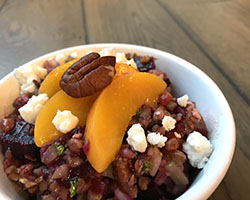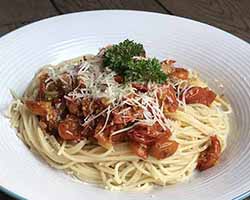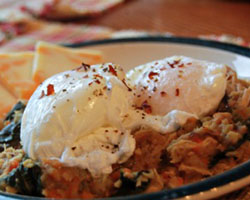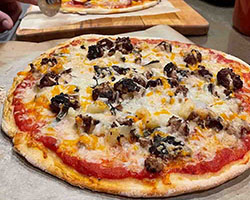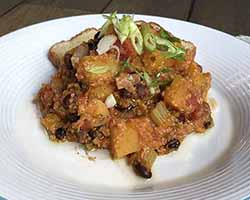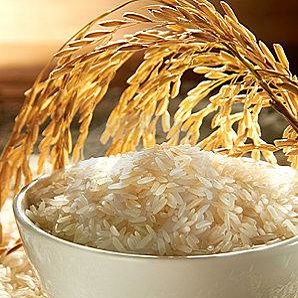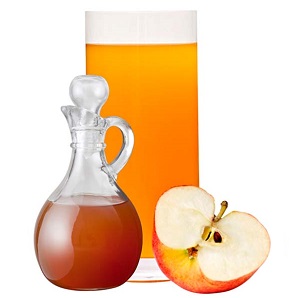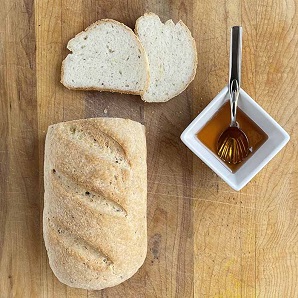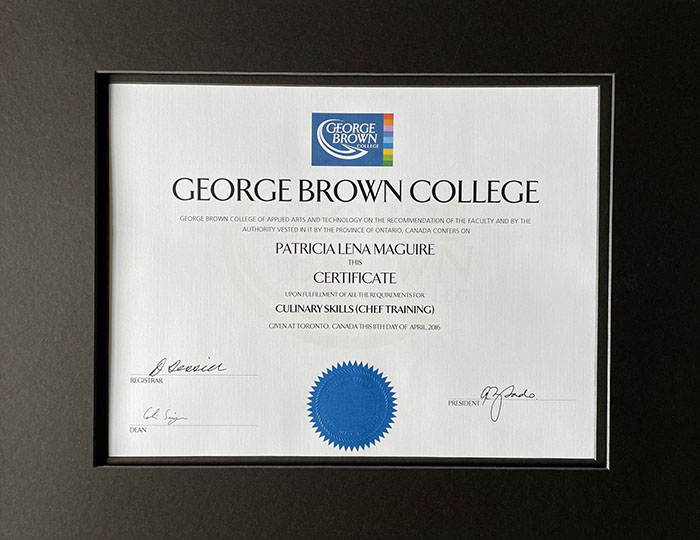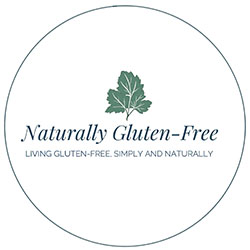- Home
- Intolerances and Special Diets
- Gluten-Free Mediterranean Diet
The Gluten Free Mediterranean Diet and Why It's Best for Celiac
How to reduce inflammation, improve digestion and
Enjoy Great Food!
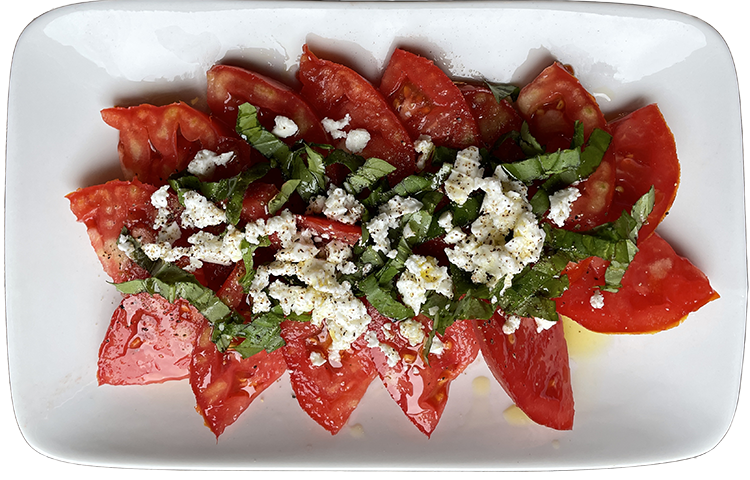
Read through or use the links below to jump to the sections that interest you.
Why Should You Adopt a Gluten-Free Mediterranean Diet?
If you're like me you're always looking for ways to make your gluten-free diet delicious and interesting. You're also looking for ways to feel good about what you eat, keep your tummy happy and take care of your long term health. A gluten-free Mediterranean diet may help you with those goals.
What is the Mediterranean Diet?
The Mediterranean diet is the traditional foods and dishes that originated in the Mediterranean basin.
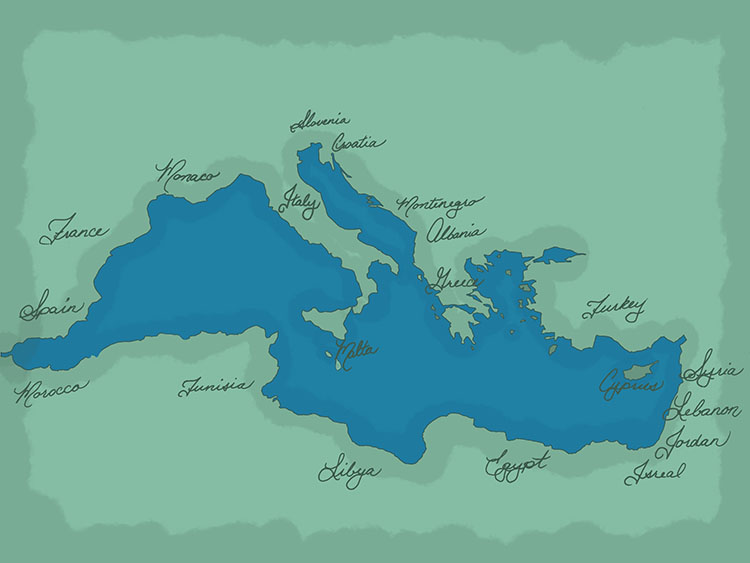
There are 22 countries in this region spanning 3 continents. This means that there is a huge diversity of cuisines in the Mediterranean diet.
We all think of Italy and Greece first, but there is so much more.
Foods of Southern France and Spain are delicious and familiar to the European palate.
Foods from North African countries like Egypt, Morocco, Tunisia, Libya and Algeria can be subtle and mild or complex and spicy.
Then there are the middle eastern countries like Turkey, Lebanon, Israel, and Syria with equally delicious choices.
What these cuisines have in common is homecooked family meals made with real, whole food, most of which is naturally gluten-free.
Is The Mediterranean Diet Gluten-Free?
Not entirely, but the focus on whole foods makes the Mediterranean Diet very easy to convert to gluten-free.
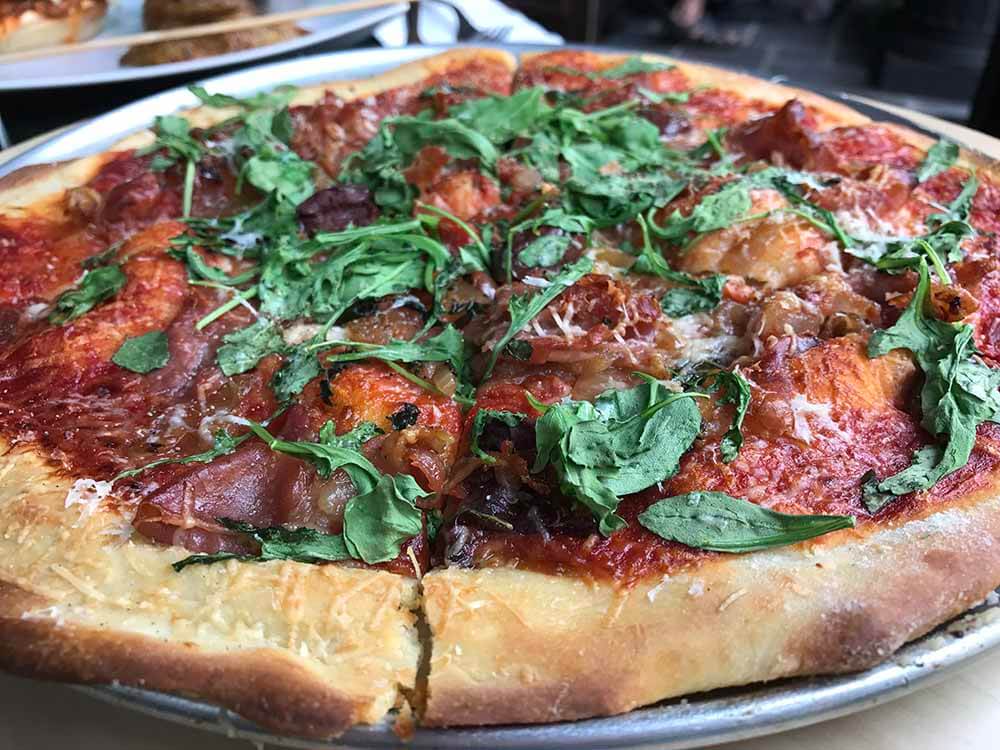
Breads and pasta are best kept to a minimum but when you do have them you can choose gluten-free versions.
Other grains that are common in the Mediterranean Diet are barley, bulgur, farro, and couscous (made from wheat). There are substitutes for these too. Your gluten-free Mediterranean diet will include gluten-free grains like rice, corn, quinoa, buckwheat, teff and amaranth.
But the Mediterranean diet, is really about fruits, vegetables, beans and legumes. All are naturally gluten-free and chocked full of vitamins, minerals and fiber.
Is The Mediterranean Diet Good for Celiac Disease?
Yes!
Dr. Stefano Guandalini is an internationally recognized celiac disease expert. He is also founder of the University of Chicago Celiac Disease Center. Dr. Guandalini often recommends a gluten-free Mediterranean diet for his celiac disease patients.
As you may know, inflammation is a problem for people with celiac disease. It often continues to be a problem even after being on a gluten free diet. This is partly because gluten-free processed foods have a lot of sugar and unhealthy fats and starches which are difficult to digest.
The healthy, whole, naturally gluten-free foods in the Mediterranean diet calm inflammation and promote a healthy gut microbiome.
Protects against chronic diseases
The Mediterranean diet protects against chronic diseases like heart disease, cancer and diabetes. This could be because is it so rich in fiber and healthy fats. This is very important for people with celiac as we are more susceptible to these conditions.1
May Protect Against the Onset of Celiac Disease
According to Dr. Guandalini, starting a Mediterranean diet early may prevent celiac disease in susceptible2 children. The research is very new, but wouldn’t this be amazing news!
Imagine if you knew that you or your partner might be passing the celiac gene on to your children. Now imagine knowing that starting them on the Mediterranean diet early could prevent the disease.
Mediterranean diet for gut health
If you follow my work or read my monthly newsletter you know that I’ve developed a bit of a microbiome obsession.
The Mediterranean diet has been shown to have a positive affect on the microbiome.3 This could be because it's loaded with fiber from vegetables, beans and grains. Maybe this explains the protective affect in children who are predisposed to celiac. Protect the gut, prevent celiac?
We are also learning how sugar and processed foods damage the microbiome. This damage leads to inflammation and “leaky gut” which then leads to chronic disease. A gluten-free Mediterranean diet is low in processed food and sugar. This helps to keep your microbiome happy.4
The Mediterranean Diet for Celiac Disease
Dr. Alessio Fasano, another world-renowned celiac disease expert and Director of the Center for Celiac Research and Treatment at Massachusetts General Hospital tells us that for celiac disease to develop you need 5 things. 5
1. The gene
2. A trigger, which could be some physical or emotional trauma
Then three more, highly interconnected conditions:
3. Loss of barrier function or “Leaky gut”
4. An immune system that has become “hyper belligerent”
5. An unbalanced microbiome.
Dr. Fasano also endorses a gluten-free Mediterranean diet for celiac disease.
Gluten-Free Mediterranean Cooking
Are you wondering what Mediterranean foods are gluten-free?
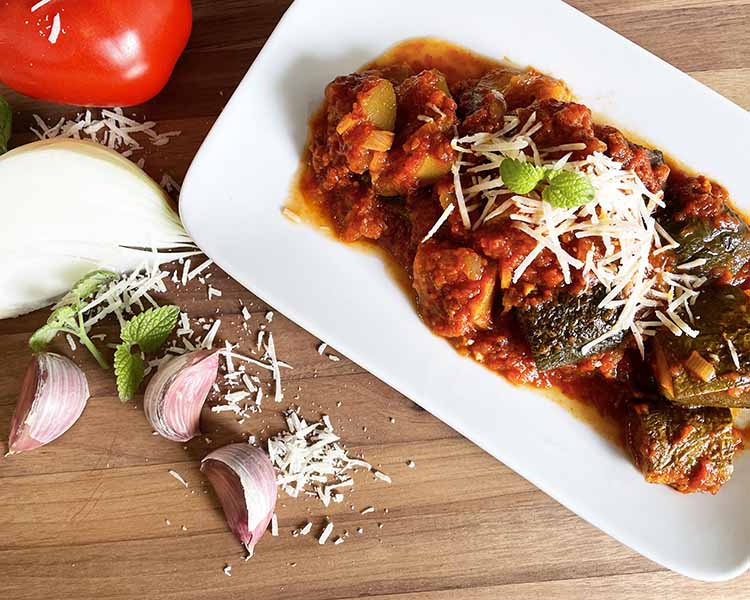
Gluten Free Mediterranean Foods
Keep these ingredients on hand for your gluten-free Mediterranean cooking:
Olive Oil
Olive oil is a Mediterranean staple. It's naturally gluten-free and is essential for your gluten-free Mediterranean diet.
Extra virgin olive oil is nice for salads. It’s also expensive and not necessary for cooking.
Try a less expensive and more neutral flavored oil for cooking. A light olive oil or other vegetable oil would work just fine.
For more about olive oil, check out this article: https://www.masterclass.com/articles/complete-olive-oil-guide
Fruits and Vegetables
All fresh fruits and vegetables are naturally gluten-free, and are abundant in the Mediterranean diet. These will be the centerpiece for your gluten-free Mediterranean diet.
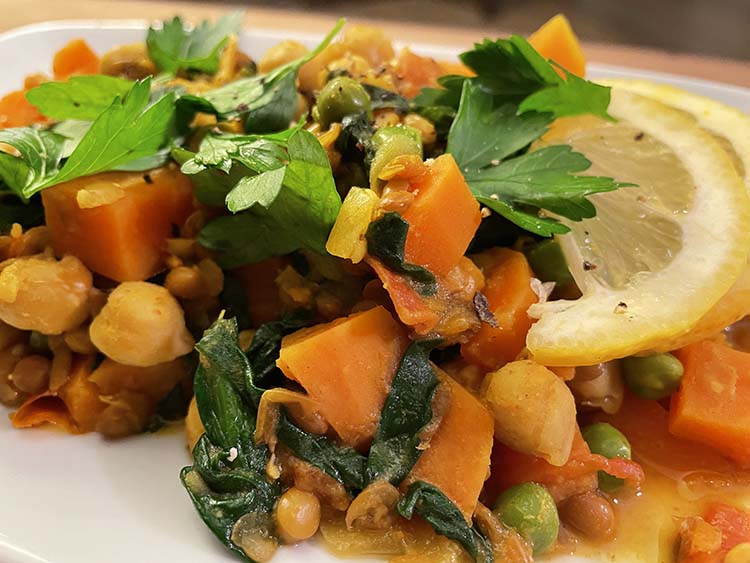
Choose fresh and local as much as possible.
Fruits you’ll see often are lemons, apples and berries along with olives and tomatoes. If fresh fruits aren’t available, frozen is the next best option.
Lots of recipes call for canned tomatoes and tomato sauces. These are a nice convenience and will give you excellent results.
Many gluten-free Mediterranean recipes include vegetables like zucchini and eggplant. They also use a lot of greens like kale, spinach, and collards. Focus on crunchy high fiber veggies and less on the starchy ones like potato.
If fresh veggies aren’t available, frozen is the next best option.
Meats
All whole fresh cuts of meat, fish and poultry are naturally gluten free. The Mediterranean diet has more fish and seafood and smaller amounts of meat and poultry.
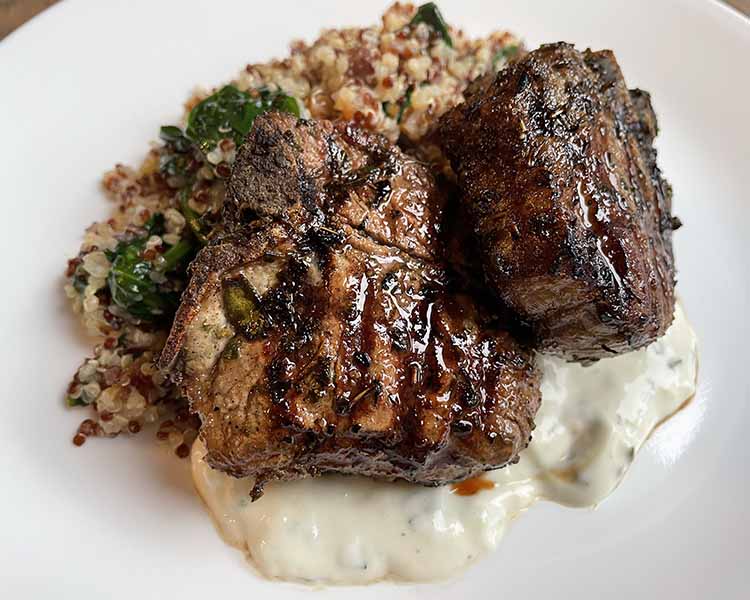
In North American meals, meat is often the centerpiece then the sides compliment the meat dish. Mediterranean meals often resemble stews or casseroles, with lots of veggies and just a little meat to add protein and flavor.
Many Mediterranean recipes will call for sausage or cured meats. There are gluten-free options available, just be sure to check labels.
Grains
A first glance it seems like there is a lot of wheat in Mediterranean dishes.
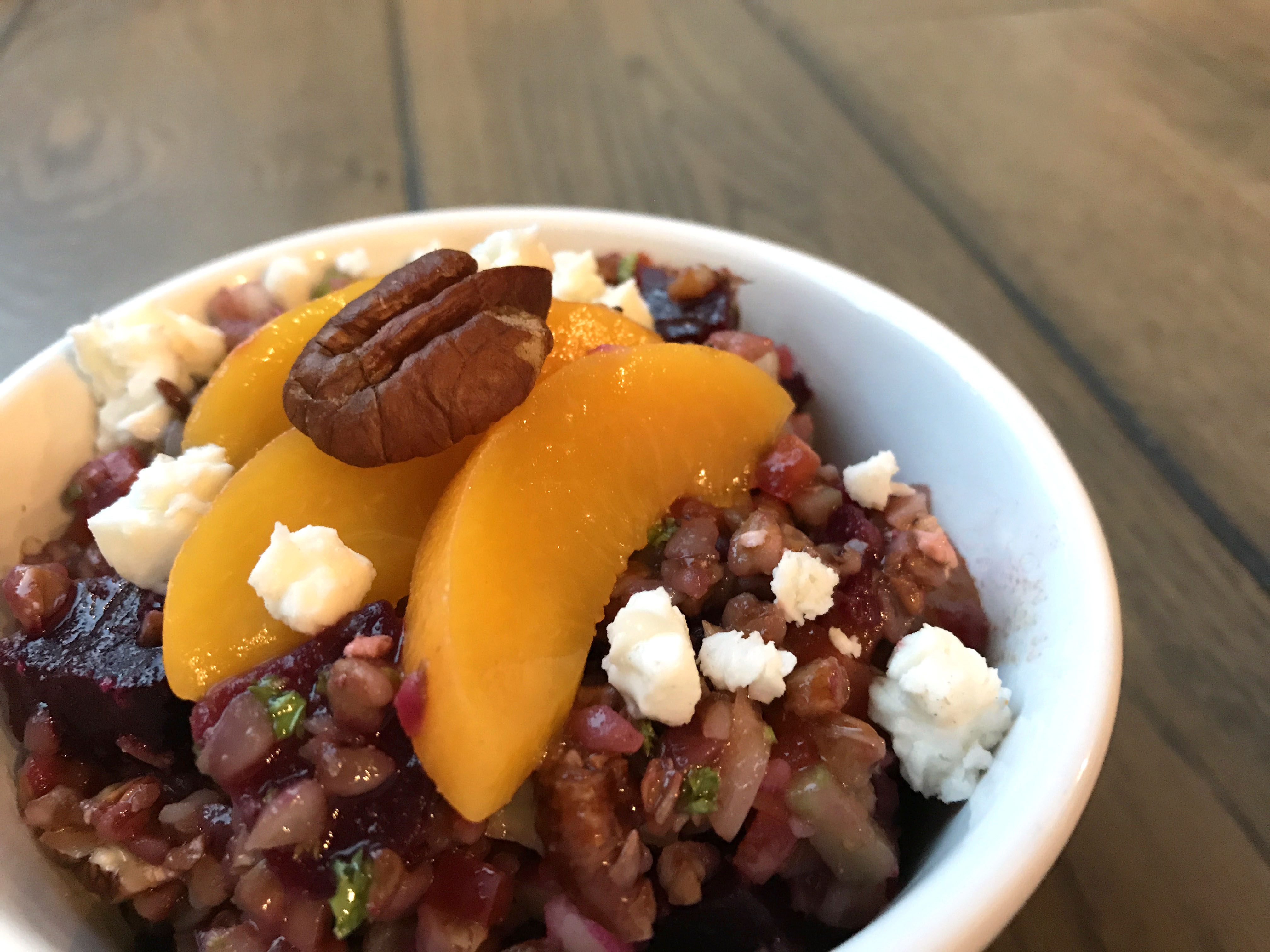
It’s true that the bread, pasta and couscous you see so much of are made from wheat. It also shows up in the form of bulgur, farro, freekeh and wheat berries, which are varieties of wheat and not gluten-free. Many recipes call for barley which also has gluten.
The good news is you can substitute these for gluten-free grains.
Gluten-free grains in Mediterranean cooking include many varieties of rice as well as, quinoa, millet, and cornmeal.
Always make sure grain products are labelled gluten-free as there is a high risk of cross contamination. The exception is rice as it is rarely grown, processed, or shipped alongside gluten grains.
Beans and Legumes
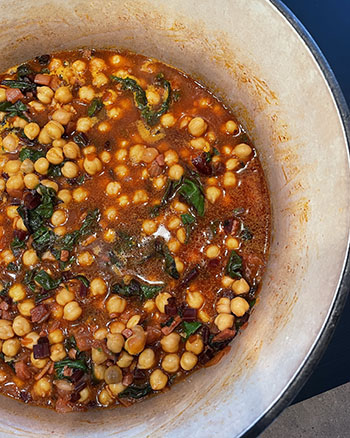
Chickpeas and lentils are staples in gluten-free Mediterranean cooking. You’ll see them added to salads and as the star in stews and soups. Green beans, peas, and many varieties of dried and canned beans are used generously in Mediterranean cuisine.
Nuts and Seeds
Keep some almonds, walnuts, pecans, sunflower seeds and sesame seeds in your gluten-free pantry. You can sprinkle them on dishes as a condiment, add them to salad or process them into sauces and dips. They are filling and add fiber, vegetarian protein, and healthy fats.
Cheese
There are many varieties of cheese in Mediterranean cooking but not in the quantities we in North America might expect.
You may think of pizza or lasagna dripping with greasy melted mozzarella. But in authentic Mediterranean cooking, the cheese is more of a condiment. Beautiful hard aged cheeses like parmigiana or pecorino Romano are sprinkled lightly to add flavor and umami. Soft ripe cheeses like fresh mozzarella or brined cheese like feta compliment salads and vegetable dishes.
If you are lactose intolerant or casein intolerant you may be in luck. Hard cheeses are low in lactose. Also, cheese made from goat and sheep milk are common in Mediterranean dishes and are often well tolerated.
Herbs and Spices
Most individual spices are gluten-free, just check the label to be sure.
You'll want to keep these Mediterranean herbs and spices in stock:
- basil
- mint
- garlic
- oregano
- fennel
- bay leaf
- cilantro
- parsley
- cumin
- coriander
- thyme
- chilis
- paprika
- smoked paprika
- rosemary
Adopting the Mediterranean Diet to Gluten Free
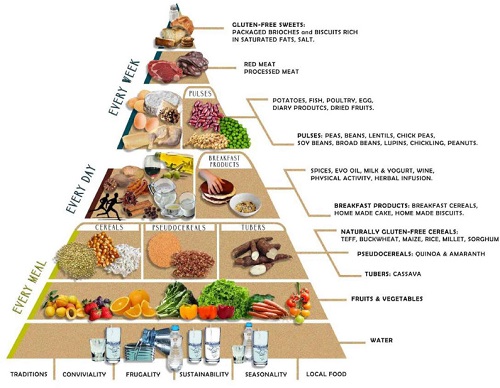 Mediterranean gluten-free pyramid re-published under Creative Commons Attribution License
Mediterranean gluten-free pyramid re-published under Creative Commons Attribution LicenseAs we can see now, most of the foods on the Mediterranean diet are naturally gluten-free. The ones that aren’t can be easily swapped out.
Instead of These
couscous
orzo
bulgar
farro
pasta
flatbreads
Try These
quinoa, amaranth or rice
long grain rice
buckwheat
rice, buckwheat or gluten free oats
gluten-free pasta, zucchini or cauliflower
gluten free flatbreads
Portion control
I read an article years ago that really stuck in my mind. It was written by a journalist who travelled to Italy and had a very weird experience in a restaurant. I wish I could remember his name or find the article but have been unable to. Anyway, the gist of the article was that he ordered pasta in a restaurant in Italy and was given a massive serving. He noticed that other patrons seated around him had much smaller servings. When he asked the server why, he was told “you’re American, that’s what Americans want.”
A serving of pasta is 2 ½ to 3 ½ ounces and it’s part of a balanced meal, not the whole meal. So next time you have your gluten-free pasta, just give it a try. Limit your serving to 2 ½ ounces or about a cup of cooked pasta. Then round out the dish with other naturally gluten-free Mediterranean foods. Add lots of veggies for a traditional primavera.
One trick that's worked well in our home is to cook only enough pasta for the meal. That way we won't be tempted to go back for seconds.
The same goes for pizza. I love a great gluten-free pizza as much a you do, but we’ll both be healthier and thinner if we limit ourselves to a couple of slices and fill up on veggies.
Summary
 |
The Mediterranean diet is known to prevent many chronic diseases. |
 |
The Mediterranean diet is anti-inflammatory and supports a healthy, balanced gut microbiome. |
 |
A gluten-free Mediterranean diet is especially healthy for people with celiac disease. |
 |
The Mediterranean diet is easy to convert to gluten-free because it is mostly made up of naturally gluten-free foods. |
Gluten-Free Mediterranean Recipes
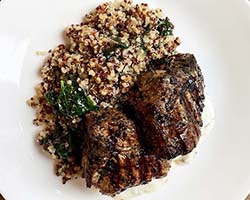 Moroccan "Couscous" with Quinoa
Moroccan "Couscous" with QuinoaHome > Intolerances and Special Diets > Gluten-Free Mediterranean Diet
Sources:
1. Clerx, E. M., & Dennis, M. (2018, August 18). Combining the Mediterranean diet and the gluten-free diet. Beth Israel Deaconess Medical Center. Retrieved August 28, 2022, from https://www.bidmc.org/-/media/files/beth-israel-org/centers-and-departments/digestive-disease-center/celiac-center/mediterranean-gf-diethandout-08-31-2018ak-md-js.ashx?la=en&hash=93C31060FAAB5FF6440F324CF3DE993B6D18C0B0
2. YouTube. (2022). Beyond Celiac Town Hall: Conditions Related to Celiac Disease Q&A with Stefano Guandalini, Md. YouTube. Retrieved August 28, 2022, from https://www.youtube.com/watch?v=rVBGMYrgMks.
3. Williams, E. (2017, January 9). Gastrointestinal benefits of the Mediterranean diet. Premier Medical Group. Retrieved August 28, 2022, from https://www.premiermedicalhv.com/news/gastrointestinal-benefits-of-the-mediterranean-diet/
4. Lustig, R. H. (2021). The "Diseases" That Aren't Diseases. In Metabolical: The lure and the lies of processed food, nutrition, and Modern Medicine (pp. 104–117). essay, HarperWave, an imprint of HarperCollinsPublishers.
5. The Microbiome and Our Health. (2022). CrossFit. Retrieved May 9, 2022, from https://www.crossfit.com/health/the-microbiome-and-our-health?topicId=article.20220429103948935&fbclid=IwAR1kwFpBZYYzb76W0ZZrNa_rCnaptwCjvPCx2yPtwaDqkYM6wvC5Gc1UcQs.
Cooking, food and other information sources from: Americas Test Kitchen. (2021). The complete Mediterranean Cookbook: 500 vibrant, kitchen-tested recipes for living and eating well every day.


